Overview
This article examines seven cloud platforms that title companies can leverage to significantly enhance their operational efficiency. These platforms, including Parse AI, AWS, and Microsoft Azure, provide distinct features such as automation, data management, and security enhancements. Collectively, these capabilities streamline workflows, reduce costs, and improve data handling within the real estate sector, underscoring their importance in today’s competitive landscape.
Introduction
In an increasingly digital landscape, title companies are embracing innovative cloud platforms to streamline operations and enhance efficiency. This article delves into seven cutting-edge solutions designed to empower these firms, ranging from advanced machine learning tools to robust database management systems. As competition intensifies, the pressing question emerges: which cloud platform will offer the most significant advantage in optimizing workflows and ensuring data security within the real estate sector?
Parse AI: Advanced Machine Learning for Title Research Automation
Parse AI employs cutting-edge machine learning algorithms to automate the extraction of critical information from document titles. By utilizing optical character recognition (OCR), the platform adeptly processes extensive data sets, enabling researchers to generate abstracts and reports with exceptional speed and accuracy. This automation leads to a substantial increase in productivity, with organizations experiencing a projected upon implementing advanced document intelligence platforms.
Moreover, the significant reduction in human error—exceeding 95% in certain instances—highlights the indispensable role of OCR in enhancing operational efficiency. As Viktoriia Podliesnova, Delivery & Project Manager, notes, "IDP assists companies in adhering to industry regulations," underscoring the vital function of OCR technology in real estate document research.
Real estate firms that adopt OCR technology not only optimize their workflows but also achieve considerable cost savings, establishing it as a crucial asset in the competitive landscape of property research.
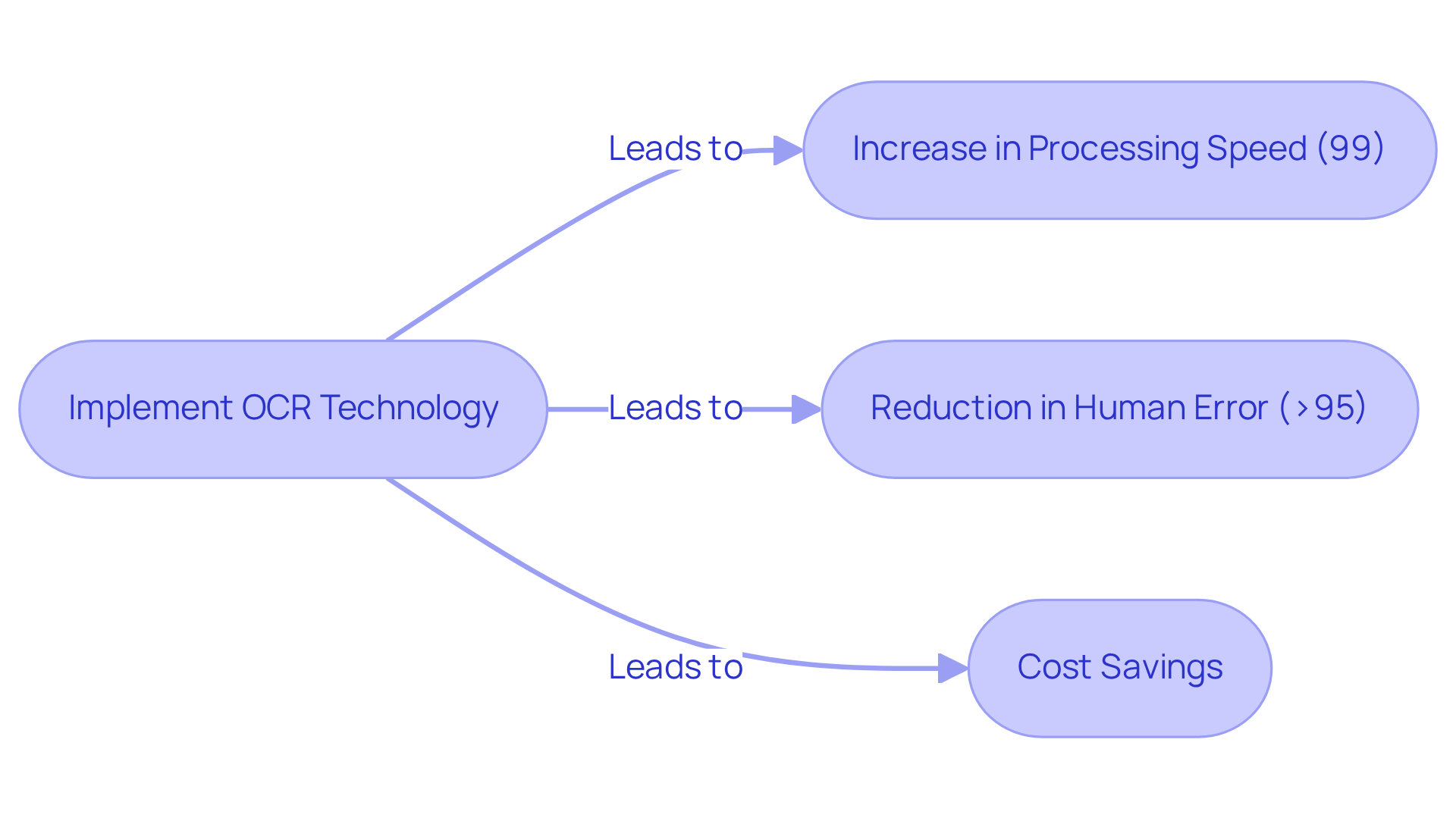
Amazon Web Services (AWS): Scalable Cloud Infrastructure for Data Management
Amazon Web Services (AWS) provides robust and adaptable cloud platforms for title companies within the real estate sector. By employing services such as Amazon S3 for efficient storage and Amazon RDS for powerful database management, AWS empowers companies to manage substantial volumes of information with ease.
According to industry statistics, organizations utilizing AWS can achieve cost reductions of up to 30% compared to traditional [information management solutions](https://blog.parseai.co/10-dashboards-for-tracking-title-services-to-boost-efficiency). Furthermore, the inherent scalability of AWS allows organizations to dynamically adjust their resources in response to fluctuating demands, making it a financially prudent choice for managing variable workloads.
This flexibility not only enhances operational effectiveness but also results in , positioning AWS as a premier choice among cloud platforms for title companies aiming to optimize their information management processes in 2025.
As Dr. Chris Harding emphasizes, establishing standard metrics for the digital landscape is crucial for evaluating success in modern enterprises, and AWS provides the necessary tools for this assessment. For firms seeking to elevate their information management, considering AWS's scalable infrastructure could serve as a transformative advantage.
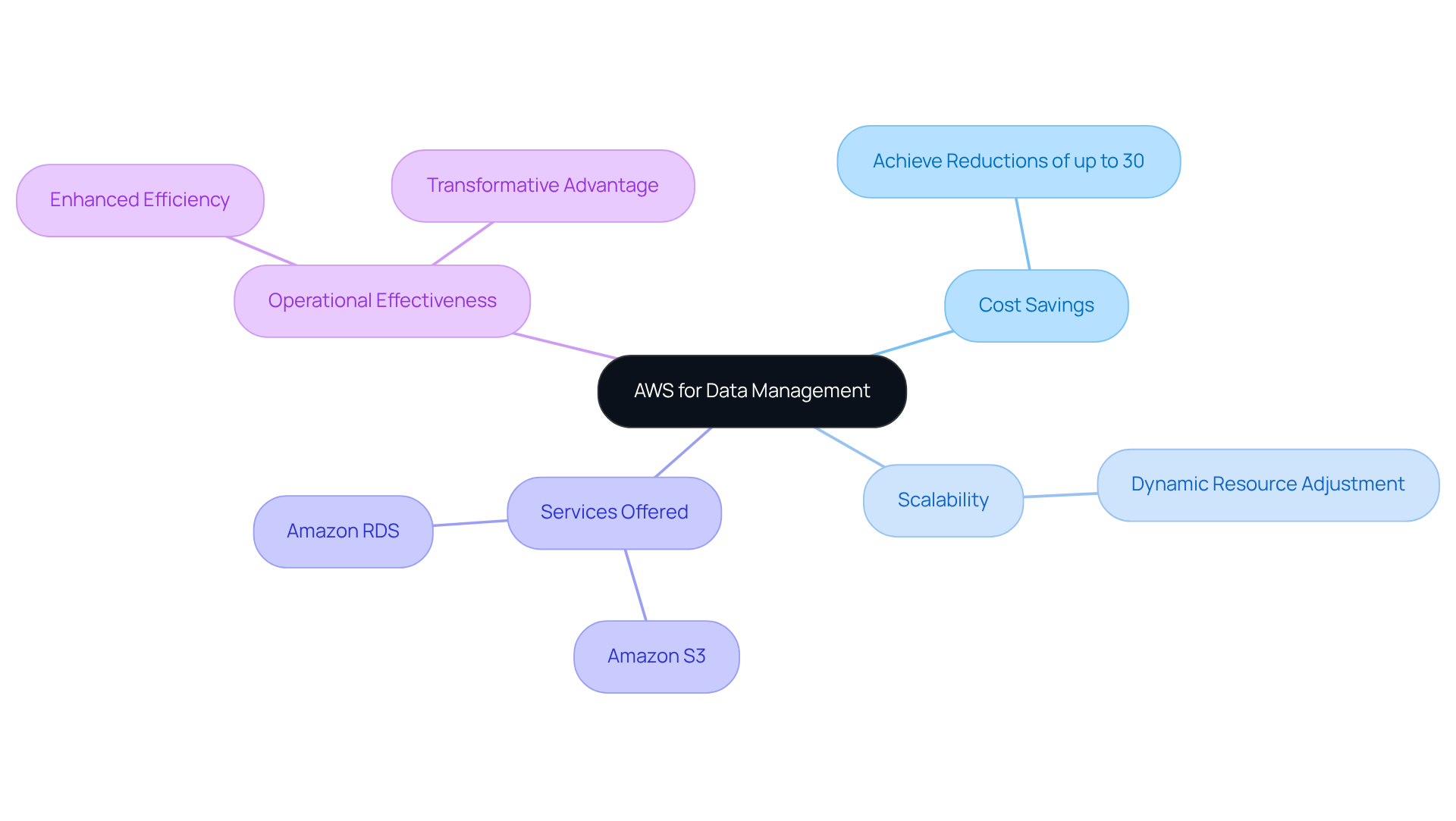
Microsoft Azure: Hybrid Cloud Solutions for Integrated Operations
Microsoft Azure offers robust hybrid solutions that empower title companies to seamlessly integrate their existing on-premises systems with advanced online capabilities provided by cloud platforms for title companies. This integration provides the while ensuring control over sensitive information, a crucial consideration for real estate firms. Azure's comprehensive suite of tools enhances collaboration and data sharing, significantly boosting operational efficiency across various departments.
Notably, the hybrid computing market is projected to grow from US$44.6 billion in 2020 to US$128 billion by 2025, underscoring the increasing reliance on such solutions. Furthermore, 60% of C-Suite executives identify security as the primary benefit of cloud computing, reflecting Azure's dedication to protecting sensitive data.
By adopting Azure, industry firms can streamline their workflows, reduce costs, and elevate their service delivery, positioning themselves advantageously in the evolving real estate landscape.
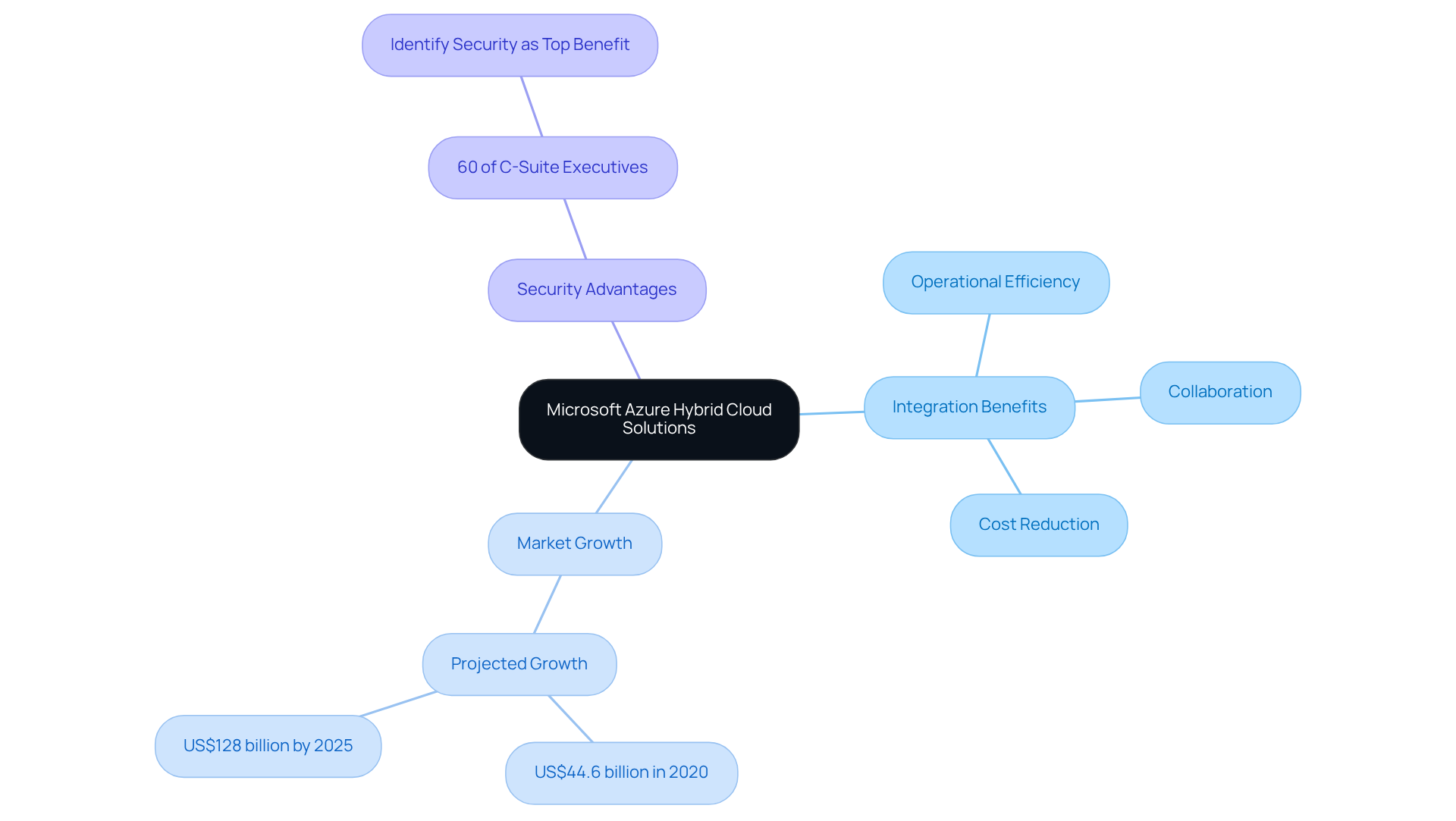
Google Cloud Platform (GCP): AI and Machine Learning for Enhanced Data Analysis
Google Cloud Platform (GCP) provides robust AI and machine learning resources that significantly enhance information analysis for firms. By utilizing BigQuery for data warehousing, companies can efficiently store and analyze extensive volumes of content, leading to faster insights and improved decision-making. Furthermore, the integration of AutoML facilitates the development of custom machine learning models tailored to specific business needs, thereby enhancing risk assessment and operational efficiency in real estate transactions. Industry leaders have observed that leveraging GCP's capabilities not only streamlines workflows but also cultivates a , ultimately driving superior outcomes in the competitive real estate market.
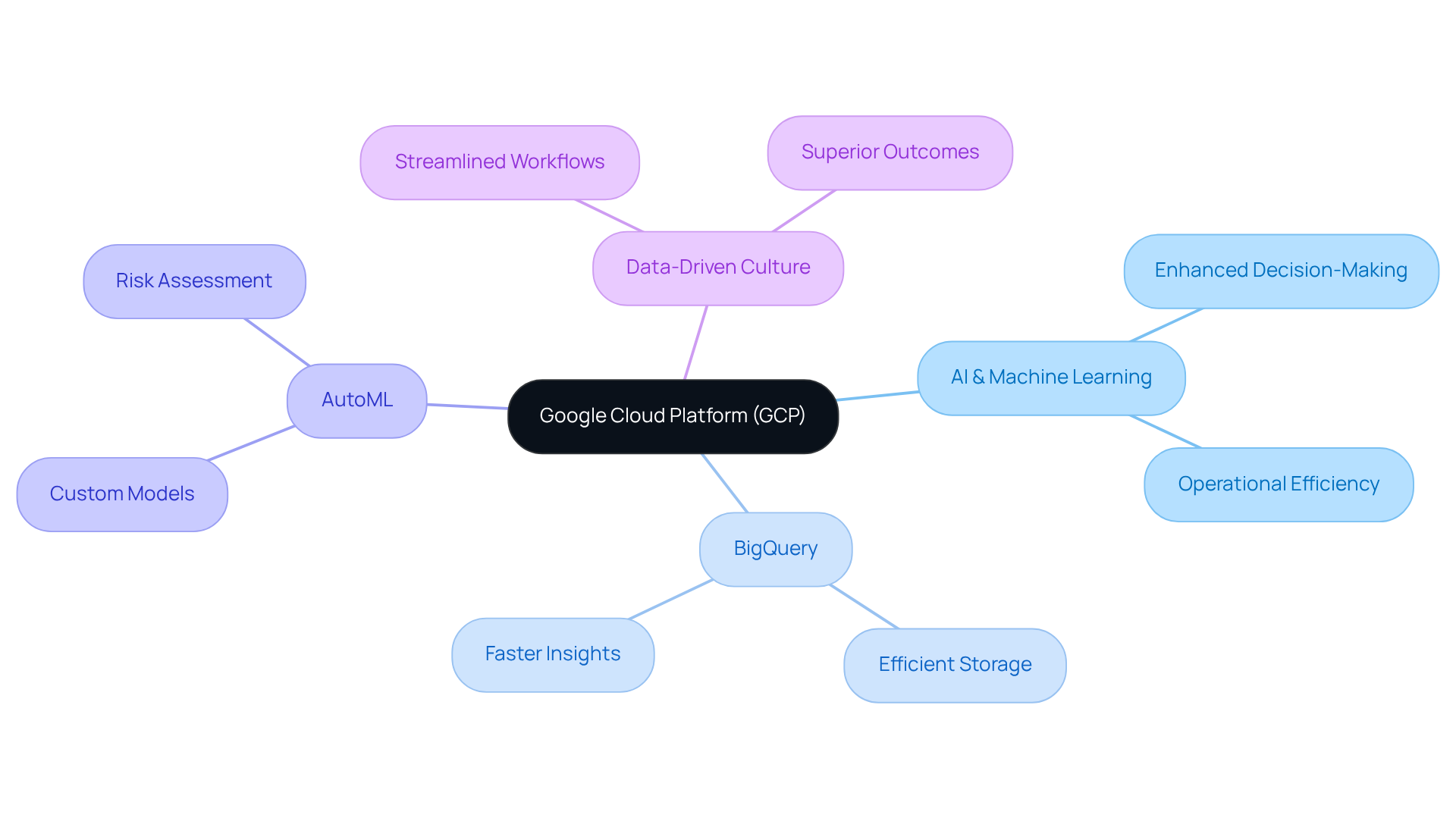
IBM Cloud: Multi-Cloud Management for Flexibility and Control
IBM Cloud provides multi-environment management solutions that empower companies to operate seamlessly across diverse computing platforms. This flexibility enables organizations to select the most appropriate services from various providers, leading to significant operational optimization and potential savings of up to 30% on costs.
Moreover, IBM Cloud's advanced security features protect sensitive title data across all cloud platforms for title companies, fulfilling the essential demand for in the real estate sector. As Vivek Kundra asserts, online computing can surpass traditional computing in security, thanks to superior cybersecurity personnel.
Additionally, optimizing operations across multiple online environments not only enhances efficiency but also fosters innovation, allowing companies to swiftly adapt to market demands. Dr. Chris Harding advocates for the establishment of standard metrics for online storage and ROI models, which can aid organizations in evaluating the effectiveness of their digital strategies.
Meanwhile, Marc Benioff highlights the democratizing effect of online computing, making these services accessible to enterprises of all sizes.
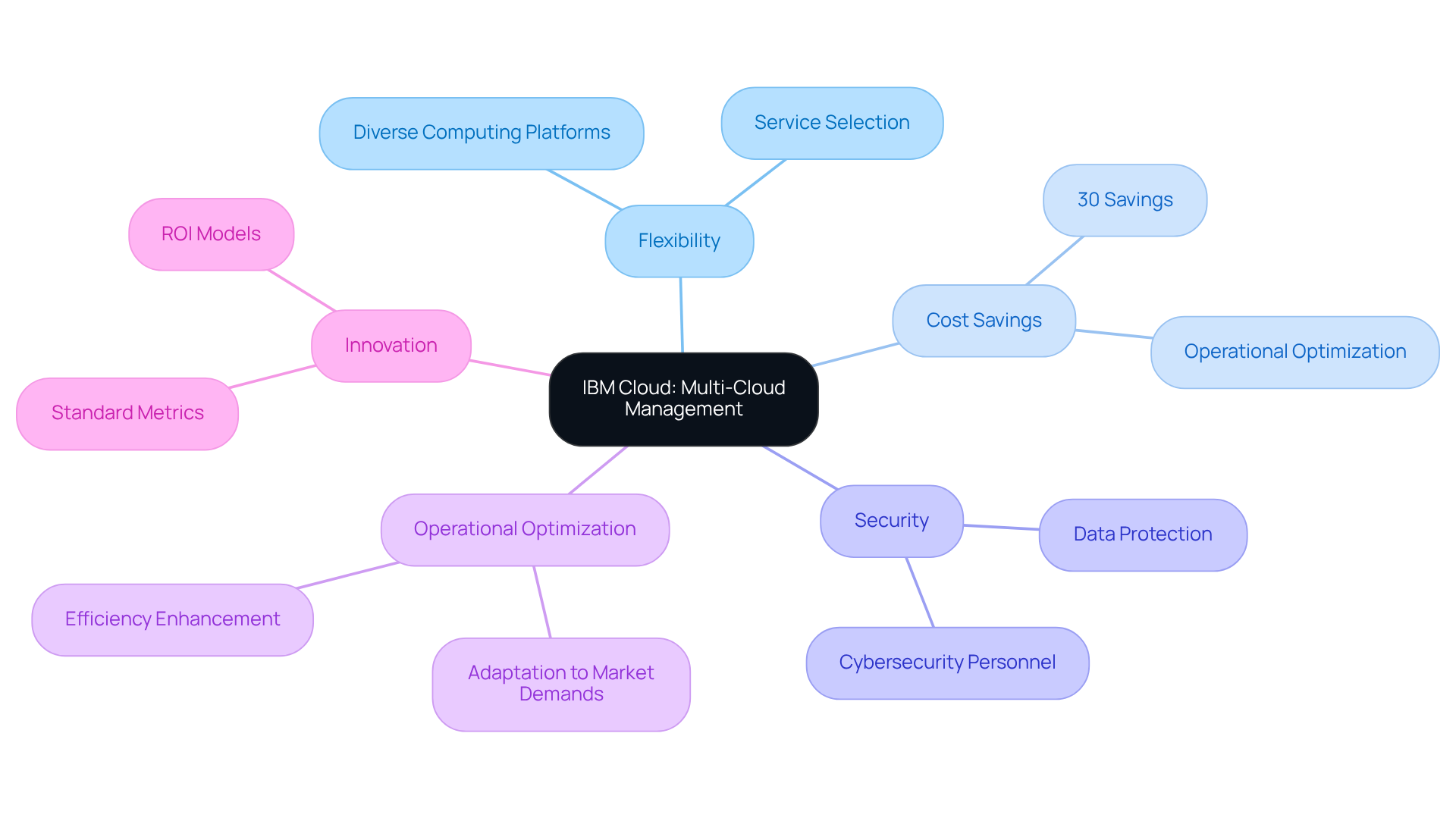
Salesforce Cloud: CRM Solutions for Improved Client Interactions
Salesforce Cloud stands as a leading CRM platform, expertly designed to empower organizations in managing client interactions with enhanced efficiency. With robust features such as automated communication, lead tracking, and comprehensive customer insights, Salesforce enables firms to cultivate stronger relationships with their clients. This refined approach to client management not only fosters increased satisfaction and loyalty but also serves as a catalyst for driving business growth.
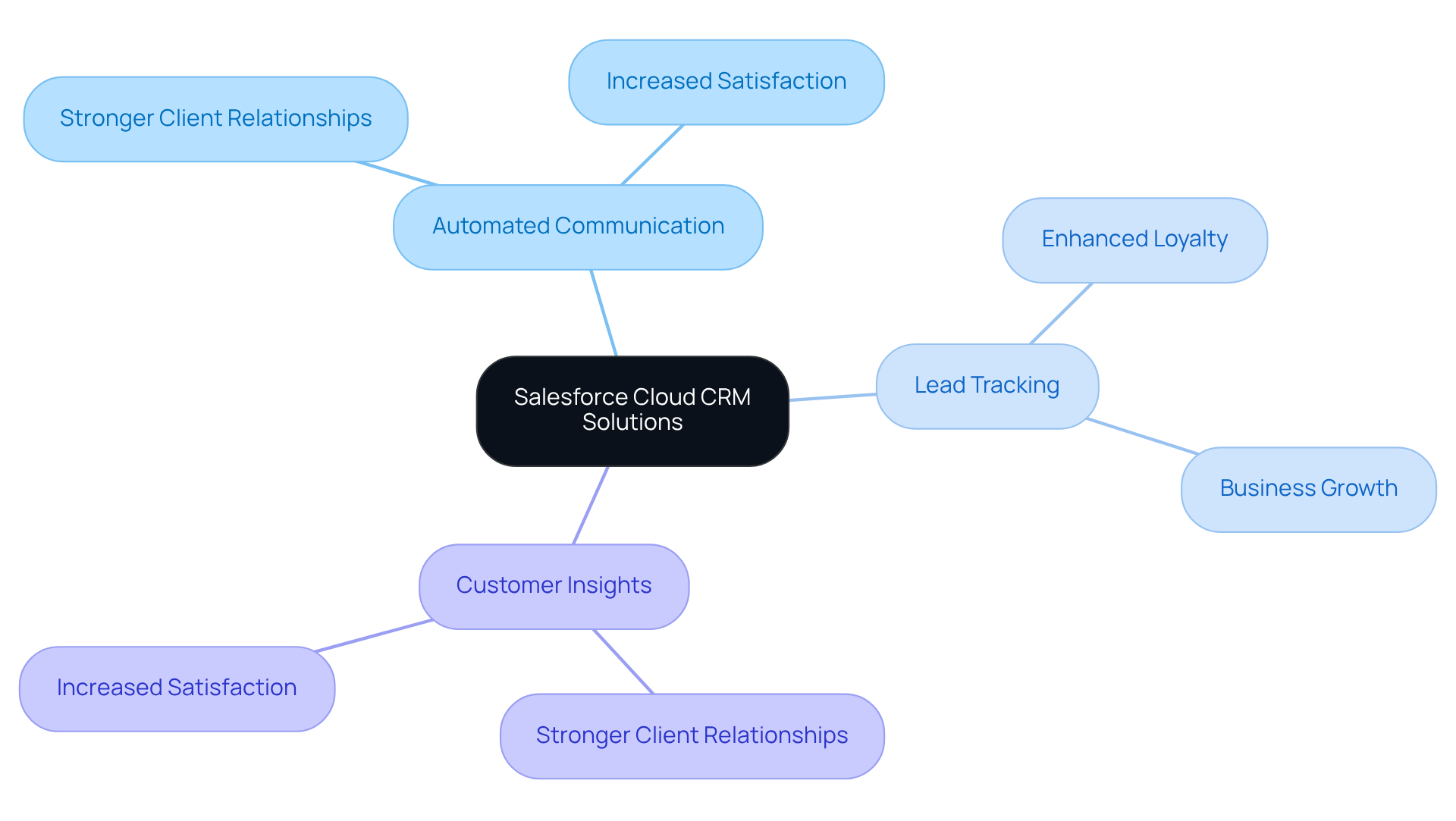
DigitalOcean: Cost-Effective Cloud Solutions for SMBs
DigitalOcean offers highly cost-effective online solutions tailored specifically for small to medium-sized businesses (SMBs), which encompass cloud platforms for title companies. With and user-friendly services, DigitalOcean empowers firms to deploy applications and manage data efficiently without incurring excessive costs. This affordability is paramount, as 73% of cloud decision-makers identify managing cloud expenditure as their foremost concern. Consequently, by leveraging DigitalOcean, firms can enhance their operational efficiency while maintaining budgetary control, rendering it an appealing choice for organizations aiming to optimize their workflows in a competitive market.
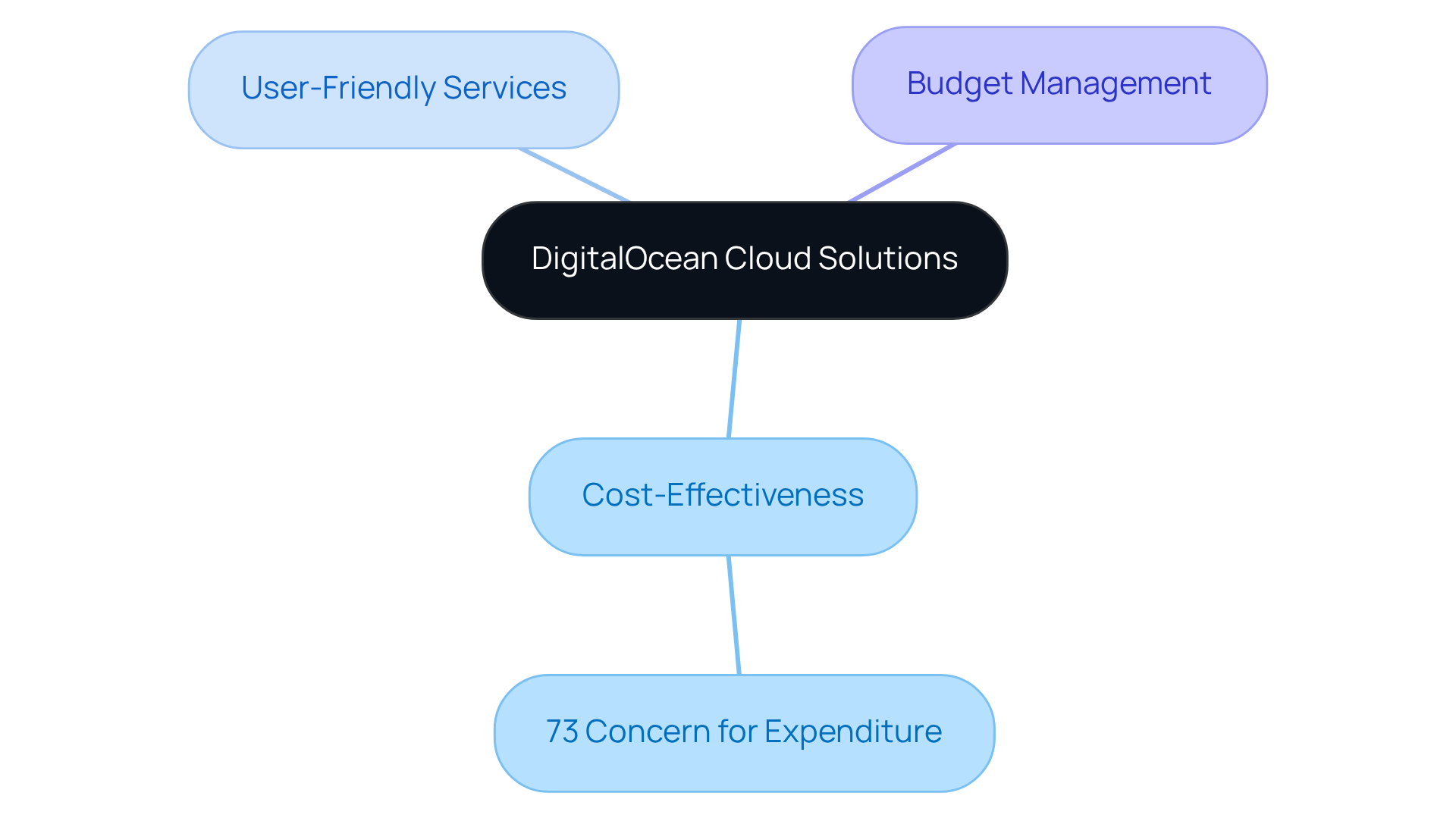
Oracle Cloud Infrastructure (OCI): Database Management for Property Data
Oracle Cloud Infrastructure (OCI) delivers essential database management solutions tailored for comprehensive property information management. Its automated backups significantly enhance information security by ensuring that record files are consistently saved and recoverable, thereby considerably reducing the risk of loss.
In 2023, the global average cost of a data breach reached $4.45 million, underscoring the urgent need for robust security measures. With features such as high availability and , OCI guarantees that record documents are not only securely stored but also readily accessible. This reliability is crucial for property companies, enabling them to use cloud platforms for title companies to provide precise and prompt information to clients and stakeholders, which in turn strengthens trust and efficiency in their operations.
As industry experts have noted, "Data privacy is now a top concern for individuals, while organizations still struggle to implement effective data protection safeguards." Furthermore, real estate companies utilizing OCI for secure record storage can leverage its innovative features, ensuring they stay ahead of emerging threats like ransomware, which affected 76 percent of organizations at least once in the previous year.
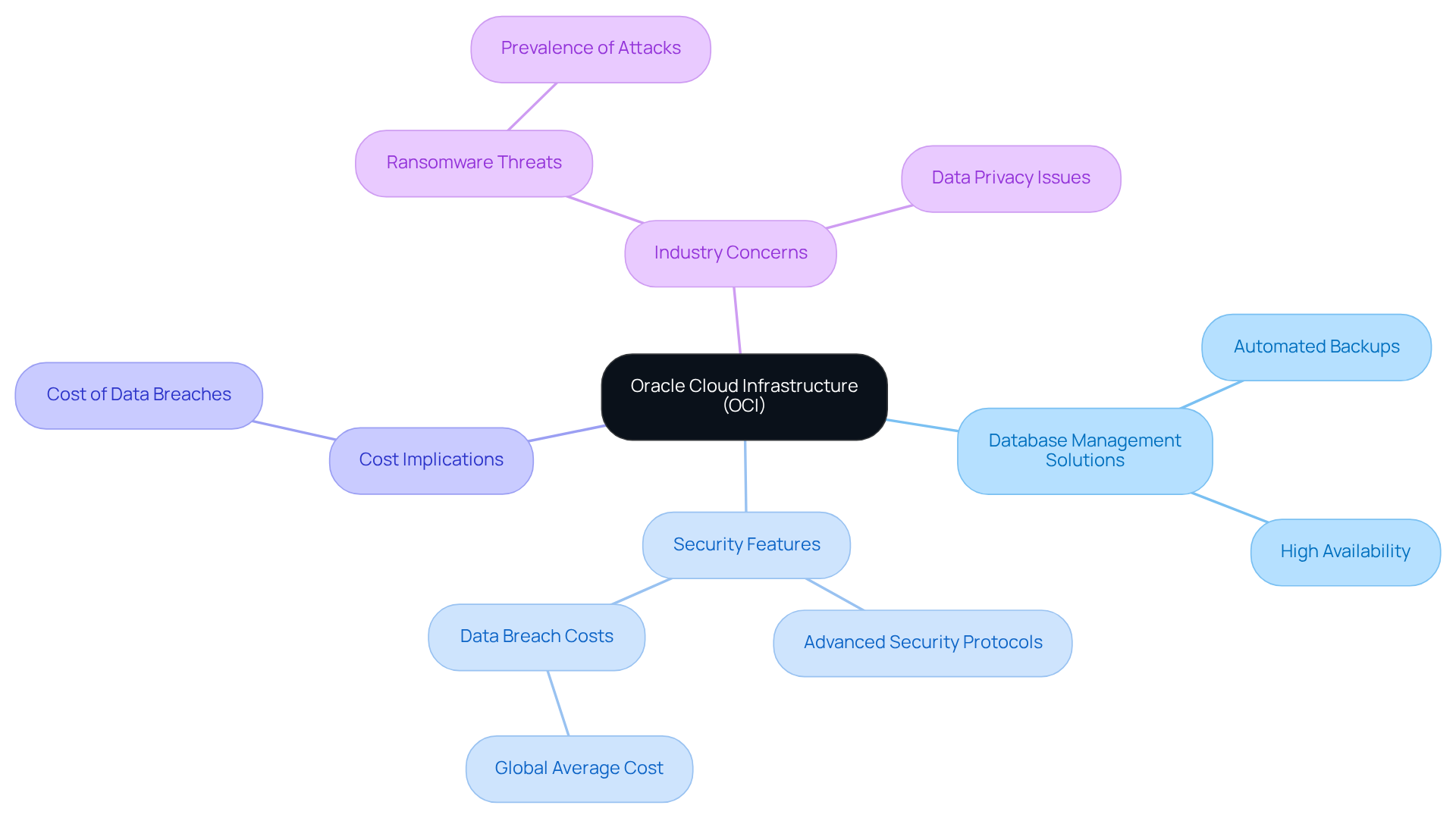
Cloudflare: Security and Performance Optimization for Cloud Applications
Cloudflare provides essential protection and performance enhancement services tailored for enterprises leveraging online technology. Its offerings—DDoS protection, web application firewalls, and content delivery networks—effectively shield title data from cyber threats, making them crucial components of cloud platforms for title companies while simultaneously enhancing application performance. This dual focus on security and efficiency is crucial for maintaining client trust and ensuring operational integrity.
As Bill Oates, CIO of Boston, emphasizes, 'It’s truly essential for us to ensure that as we transition to a remote service, the performance of that service won’t be affected by weak connectivity.'
With the online computing sector projected to grow at a compound annual growth rate (CAGR) of 18%, the adoption of becomes increasingly vital for real estate companies aiming to enhance their operational capabilities.
Nonetheless, state and local authorities face challenges in implementing these online solutions, underscoring the need for effective security and performance strategies within the research sector.
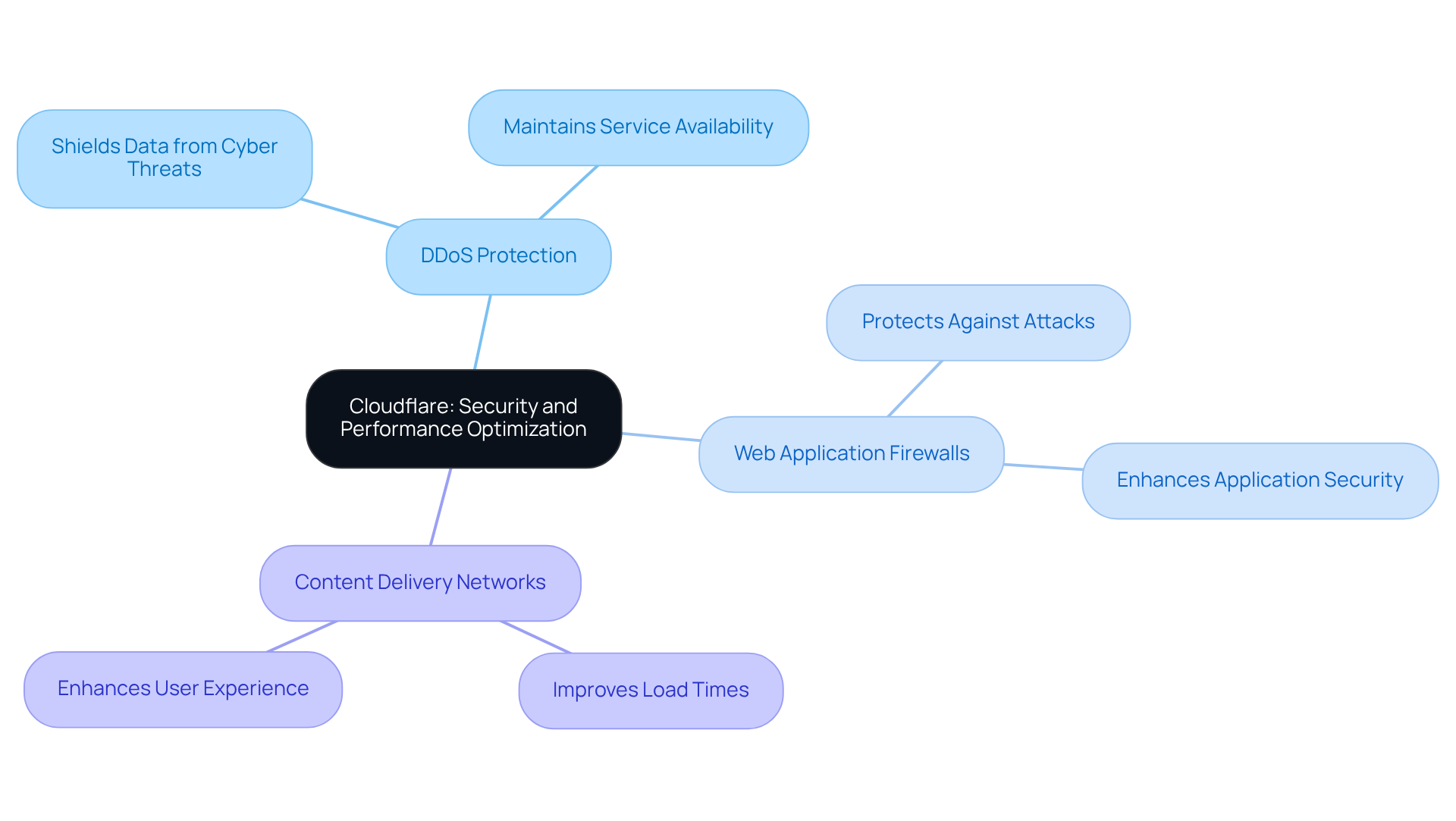
Kamatera: Customizable Cloud Infrastructure for Operational Efficiency
Kamatera delivers highly adaptable infrastructure solutions that empower businesses to tailor their environments to meet specific operational needs. With options for resource expansion, server center location selection, and application setup, Kamatera enables companies to optimize their usage for maximum efficiency. The recent launch of new data centers in Singapore, Tokyo, and Sydney significantly enhances connectivity and provides low-latency access, essential for firms striving to refine workflows and elevate service delivery.
As Tal Holzer, CEO of Kamatera, articulated, "Our new facilities in Sydney, Tokyo, and Singapore represent a major step in our mission to provide world-class cloud services to customers around the globe."
With a , including 9 in North America and 6 in Europe, Kamatera's extensive reach guarantees reliable service delivery, positioning it as one of the top cloud platforms for title companies aiming to boost operational performance and enhance client satisfaction.
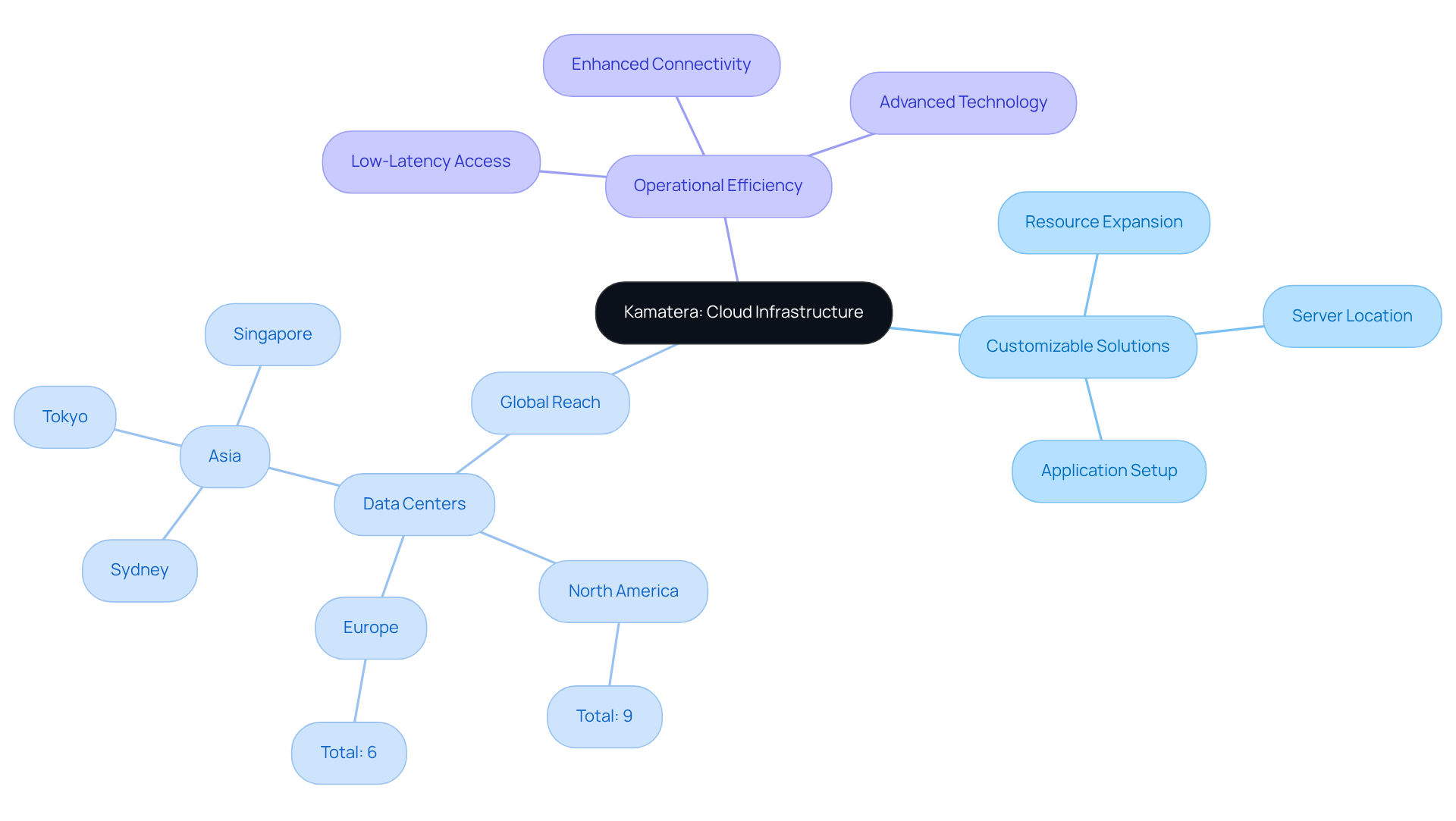
Conclusion
The integration of cloud platforms into the operations of title companies is not merely a trend; it has become an essential strategy for enhancing efficiency and competitiveness in the real estate sector. By leveraging technologies such as machine learning, hybrid cloud solutions, and advanced data management systems, title companies can streamline their workflows, reduce operational costs, and significantly improve service delivery.
Throughout the exploration of various cloud platforms, key insights emerged on how these technologies can transform title research and information management. From Parse AI’s automation capabilities that drastically cut processing times to Amazon Web Services' scalable infrastructure that adapts to fluctuating demands, each platform offers unique benefits that cater to the specific needs of title companies. Furthermore, the emphasis on security and performance optimization, as highlighted by platforms like Cloudflare and IBM Cloud, underscores the critical importance of protecting sensitive data in an increasingly digital landscape.
The call to action is clear: title companies must embrace these cloud technologies to enhance their operational efficiency and remain relevant in a rapidly evolving market. By investing in the right cloud solutions, firms can safeguard their data while leveraging advanced analytics and automation to foster a data-driven culture. As the real estate industry continues to evolve, adopting these innovations will be paramount for success and growth in the coming years.
Frequently Asked Questions
What is Parse AI and how does it assist in title research?
Parse AI employs advanced machine learning algorithms and optical character recognition (OCR) to automate the extraction of critical information from document titles, enabling researchers to generate abstracts and reports quickly and accurately.
What productivity benefits can organizations expect from using Parse AI?
Organizations can experience a projected 99% boost in processing speed and a significant reduction in human error—exceeding 95% in some cases—leading to enhanced operational efficiency.
How does OCR technology impact real estate document research?
OCR technology optimizes workflows for real estate firms, helps them adhere to industry regulations, and results in considerable cost savings, making it a vital asset in property research.
What services does Amazon Web Services (AWS) provide for title companies?
AWS offers scalable cloud platforms, including Amazon S3 for efficient storage and Amazon RDS for powerful database management, enabling title companies to manage large volumes of information effectively.
What cost benefits do organizations gain by using AWS?
Organizations utilizing AWS can achieve cost reductions of up to 30% compared to traditional information management solutions, along with significant savings due to the platform's inherent scalability.
What is the significance of Microsoft Azure in the real estate sector?
Microsoft Azure provides hybrid cloud solutions that allow title companies to integrate their existing on-premises systems with cloud capabilities, enhancing collaboration, data sharing, and operational efficiency.
What market trend is highlighted regarding hybrid computing solutions?
The hybrid computing market is projected to grow from US$44.6 billion in 2020 to US$128 billion by 2025, indicating a rising reliance on such solutions in various industries.
What are the primary benefits of adopting Azure for title companies?
By adopting Azure, title companies can streamline workflows, reduce costs, enhance service delivery, and ensure the security of sensitive data, which is a top priority for 60% of C-Suite executives.




